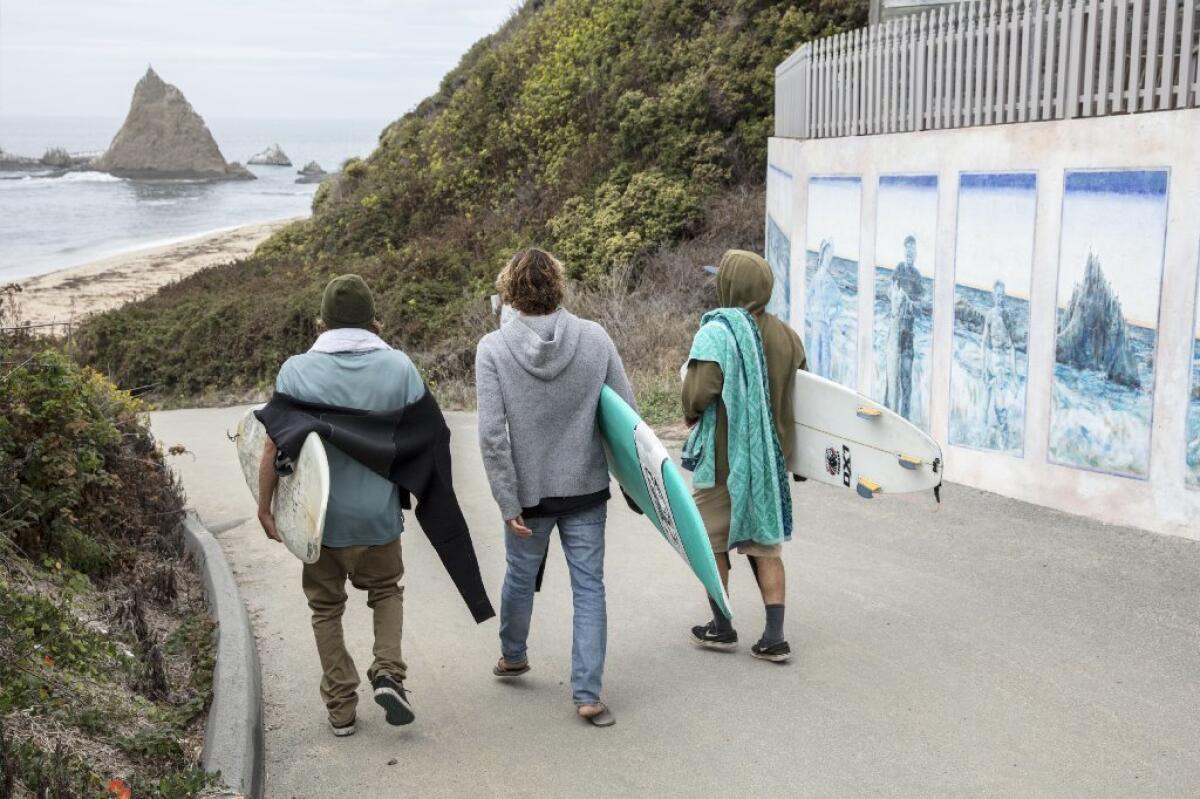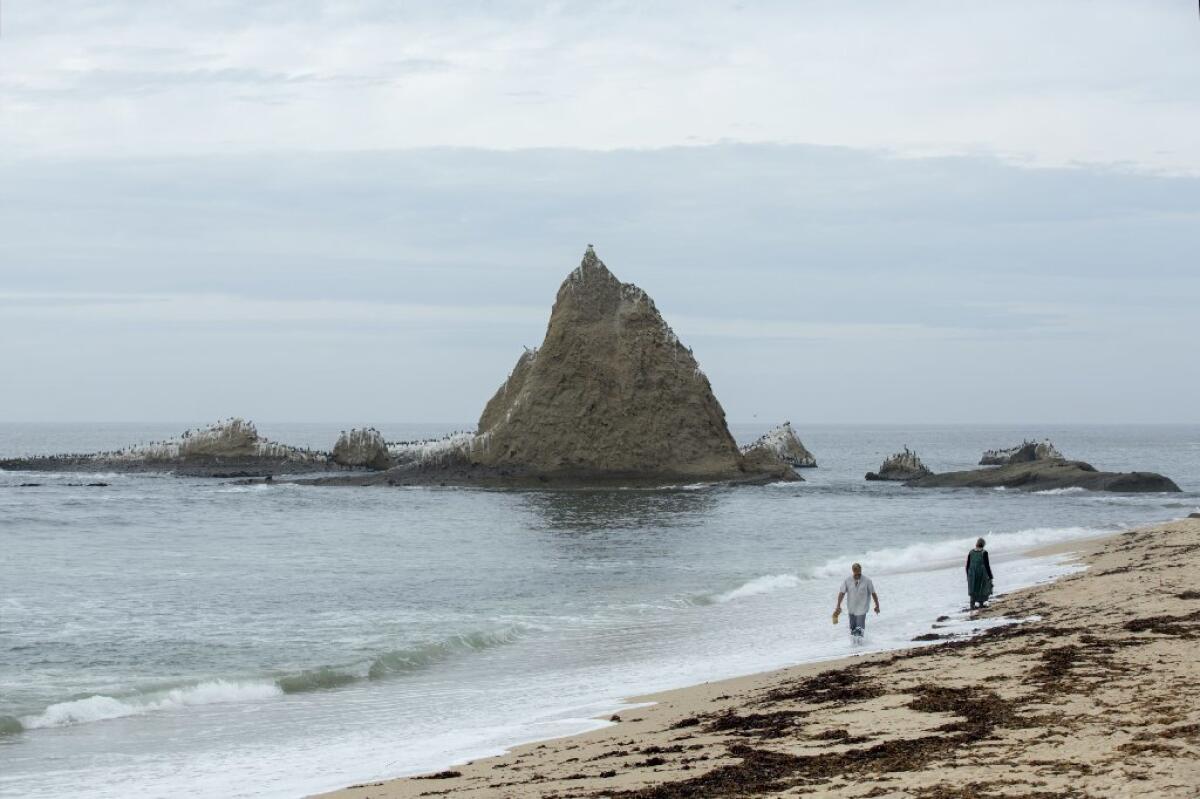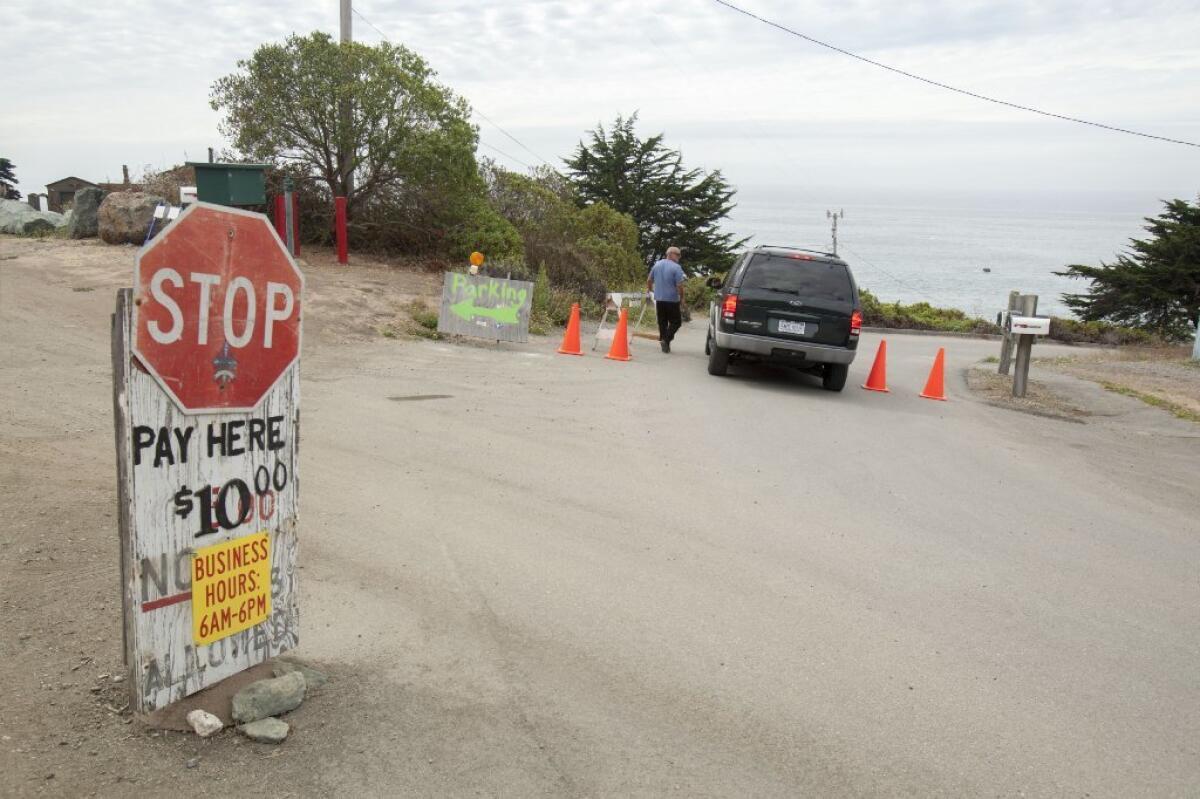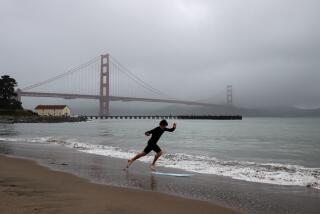U.S. Supreme Court declines to take Martins Beach case — a win for California’s landmark coastal access law

In a significant victory for coastal access rights in California, the U.S. Supreme Court on Monday rejected a Silicon Valley billionaire’s appeal to keep a beach to himself.
The decision caps an all-out legal battle over a small stretch of sand in San Mateo County known as Martins Beach. What began as a local dispute over a locked gate has exploded into a cause célèbre for beachgoers across California. The decade-long squabble spurred a spate of lawsuits that zeroed in on whether property owner Vinod Khosla needs state permission to gate off the road.
A string of California courts has said he does. If Khosla’s last-shot appeal had been granted, his arguments before the nation’s highest court could have threatened a landmark state law that declares beach access is a fundamental right guaranteed to everyone.
“The most conservative and divided Supreme Court in my lifetime confirmed that even a billionaire, who refuses to acknowledge that the law applies to him, and retains the most expensive attorneys he can find, cannot create a private beach,” said Joseph Cotchett, lead attorney for the Surfrider Foundation, which sued Khosla. “Beaches are public in California, and the immensely wealthy must comply with the Coastal Act just like everyone else.”
Dori Yob Kilmer, an attorney for Khosla, said in a statement that the case was not about public beach access, but about private property rights.
“We are disappointed the United States Supreme Court decided not to hear this important case,” she said. “No owner of private business should be forced to obtain a permit from the government before deciding who it wants to invite onto its property.”
In an interview with the Los Angeles Times earlier this year, Khosla said that he believed in the Coastal Act, but fighting this case all the way to the Supreme Court was for him a matter of principle.
“My view is: Absolutely we should increase coastal access when we can, but we should also protect private property rights,” he said. “This is about principle. Reasonableness is all I ask for.”
The battle over access at Martins Beach dates to 2008, when Khosla, a co-founder of Sun Microsystems, bought the 89-acre property south of Half Moon Bay for $32.5 million.
The Deeney family that sold Martins Beach had, for almost a century, maintained a public bathroom, a parking lot, even a general store. Surfers, fishermen and picnickers paid 25 cents to enter. The fee eventually rose to $10.
Khosla, in legal filings, said he “was willing to give the business a go, and continued to allow members of the public to access the property upon payment of a fee. But [he] soon faced the same problem the Deeneys had faced: The business was operating at a considerable loss, as the costs of keeping the beach, the parking lot and other facilities in operable and safe condition significantly exceeded the fees the business generated.”
So he shut the gate, hired security and posted “do not enter” signs.
Read more: A billionaire is willing to bring back public access to Martins Beach — for a price »
A number of public interest groups have since sued Khosla. He, in turn, has sued the California Coastal Commission, the State Lands Commission and San Mateo County, over what he considered an interference of his property rights.
A San Mateo County Superior Court judge, however, dismissed Khosla’s case, stating that he had to go through the commission’s permit process or enforcement proceedings before he could resort to a lawsuit.
The latest case began when Surfrider sued Khosla on the grounds that he failed to apply for the development permit required to change public access to the coastline. A local court sided with Surfrider and a state appeals court upheld that decision, ordering Khosla to unlock the gate while the dispute continues. Khosla appealed again to the state Supreme Court, which declined to hear the case.
Since then, the gate has been open during daylight hours. An attendant operates a small parking lot, guiding visitors down a winding ramp to a secluded crescent-shaped stretch of sand and bluffs.

Unwilling to back down, Khosla earlier this year appealed to the U.S. Supreme Court. His argument not only challenged the constitutionality of the Coastal Act — if taken up by the nation’s highest court, it would have put into question long-established land-use procedures and any state’s power to regulate development anywhere, experts said.
In his petition, Khosla’s legal team described California’s coastal policies as “Orwellian” and made the case that private property should not be taken for public use without just compensation: “the Coastal Act cannot constitutionally be applied to compel uncompensated physical invasions of private property.”
His chances were slim — of the thousands of appeals filed each year, only about 100 are granted review. But he hired a seasoned Supreme Court lawyer with a record of overcoming the odds and presenting arguments before the nation’s top justices. And with conservative interpretations of property rights gaining prominence and President Trump’s appointment of Justice Neil M. Gorsuch — and possibly another conservative appointment on the way — legal experts had said that having the right lawyer and a well-crafted argument could have been enough to capture the attention of the justices.
Briefs supporting Khosla — filed by a number of property interests groups, including the Pacific Legal Foundation and the Institute for Justice — laid out the key conservative arguments that would have been scrutinized by the highest court.
The California Assn. of Realtors and National Assn. of Realtors, urging the Supreme Court to take the case, said they were concerned that “this violation of the Takings Clause will encourage the California Coastal Commission to impose similar unconstitutional controls over the large number of properties located along the California coast, and will also encourage similar restrictions on landowners by other government agencies throughout the United States.”
The California Business Properties Assn. added that if Khosla lost, the decision would have “significant consequences for commercial real estate.”
“The right to exclude is a fundamental premise that underlies private ownership and affects every owner’s ability to control their properties in fundamental ways,” the group wrote in an amicus brief.

While the clash between property rights and beach access is highly politicized, the legal issue at hand is relatively narrow — and it clearly did not capture the attention of the justices, said Richard Frank, director of the California Environmental Law and Policy Center at UC Davis. “It only requires four votes, so if the conservative wing of the Supreme Court had voted as a block, their four votes would’ve been enough.”
The decision, Frank said, will not bring an end to fights over beach access in the state.
“It’s a zero-sum game: The more you protect private property rights, the more public access is constrained or challenged,” he said. “And the opposite is equally true.”
In the statement Monday, Khosla’s legal team said they will comply with the state courts and now begin the permit process.
“No business owner should be forced to obtain a permit from the government to shut down a private business, to change prices from those that existed in 1972 (as the state has demanded), or to change hours of operation,” the statement said. “However, we will comply with the decision of the California Court of Appeal and apply for the required permit. If denied, we will start this process over again.”
The Coastal Commission, not an official party to the Surfrider suit, said it is considering how to proceed and hopes that Khosla “will work with us to assure that the historical public access to Martin’s Beach remains available for present and future generations.”
The state has also created an account that can be used to gather donations to appraise, acquire and maintain a public access way at the beach. The State Lands Commission has suggested a public route operated like a park — with daily dawn-to-dusk hours of operation, trash bins and portable toilets. How exactly the commission would acquire this land is still being determined.
Surfrider, which celebrated at Martins Beach on Monday with coastal officials, state legislators and local surfers, said it will continue fighting for beach access.
“The Surfrider Foundation fights to preserve the rights of the many from becoming the assets of the few,” said Angela Howe, the organization’s legal director. “We are protecting everyone’s right to visit, enjoy and protect the beach, regardless of race, socioeconomic class or residential location.”
Eric Buescher, one of Surfrider’s attorneys, said that the Supreme Court’s action Monday speaks volumes to California’s coastal access law.
“This lawsuit began as a modest claim that the Coastal Act’s permit requirements apply to everyone. It grew into a fight over the future of public access along over 1,100 miles of coast in this state,” he said. “We’re grateful the California Coastal Act’s promise that the beach cannot be bought, but instead belongs to the public, has survived a billionaire’s whims, which risked gutting the statute’s protections.”
Twitter: @RosannaXia
UPDATES:
2:40 p.m.: This article was updated with additional background information as well as comments from the Coastal Commission and legal experts.
This article was originally published at 7:05 a.m.
More to Read
Sign up for Essential California
The most important California stories and recommendations in your inbox every morning.
You may occasionally receive promotional content from the Los Angeles Times.











